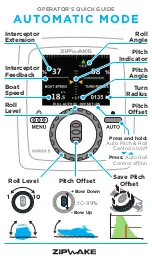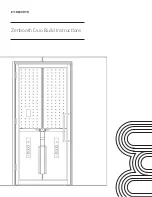
7
USB Operation
DSD
Audiophile File Formats
PureDAC with Windows OS
PureDAC with Linux
PureDAC with MAC
DSD support is not offered by the original USB 2.0 audio standard. A DSD file has to be “camouflaged” so it
appears to the DAC as a PCM file and thus can be used with USB audio. This is called DSD over PCM (DoP).
The firmware in the PureDAC detects such files and restores the original format.
The most popular format for lossless Audio is by far FLAC. Unlike MP3 it keeps all information of an audio
file, while delivering the convenience of header information like artist, track name, and the like. WAV and
AIFF are uncompressed formats also delivering the highest audio quality. The DSD formats
DSF and DFF
are still rather rare but are exception for demanding audiophile listening.
Microsoft has not followed the USB 2.0 audio protocol and therefore to use the PureDAC with Windows a
driver installation is required. The driver is on the enlosed disk named TUSBAudio. This driver is known to
work with Windows Vista, 7 and 8 and allows the PureDAC to be an operating system’s external sound
device.
The driver also installs an ASIO interface which allows direct access the PureDAC . It is the best choice for bit-
perfect playback. A recommended player software that works very well with ASIO is the JRiver Media Center.
A demo is on the enclosed CD-ROM and there is also an ASIO plug-in for the Windows Media Player.
Microsoft’s own WASAPI interface works with PureDAC but ASIO is recommended for best results.
As available software changes frequently please consult our on-line information at www.bmc-audio.com.
All modern Linux distributions support the USB 2.0 audio protocol out of the box.
There is no need to include Linux software on the enclosed disk, since the distributions offer and maintain
any recommended audio software in their repositories.
Audacious is an easy player to set up and use in Linux. It is a simple file open and play software which also
supports play-lists.
The highest-quality audiophile solution is the “Music Player Daemon” (MPD). While more difficult to set up,
this offers the best sound quality, support of any PCM and DSD format available, and a database-managed
music collection.
MPD is an invisible service (daemon in Unix terminology) and there are many user interfaces accessing
MPD. The user interface does not have to be on the same computer, so MPD can be easily remote controlled
by mobile devices such as a smart phone. GMPC is a full-blown Linux interface for MPD. MPD interfaces are
available for all popular OS including Android and Apple’s IOS. An MPD set-up description as well as a
sample mpd.conf is on the enclosed disk. All Linux software is open source and available for free.
MacOSX supports USB 2.0 out of the box. However, it is hard to get a bit-perfect playback with a Mac without
bypassing the MacOSX’s core audio. Several companies claim to have solutions for high quality audio with
Apple computers. Please refer to our on-line section for more information on these programs.






































